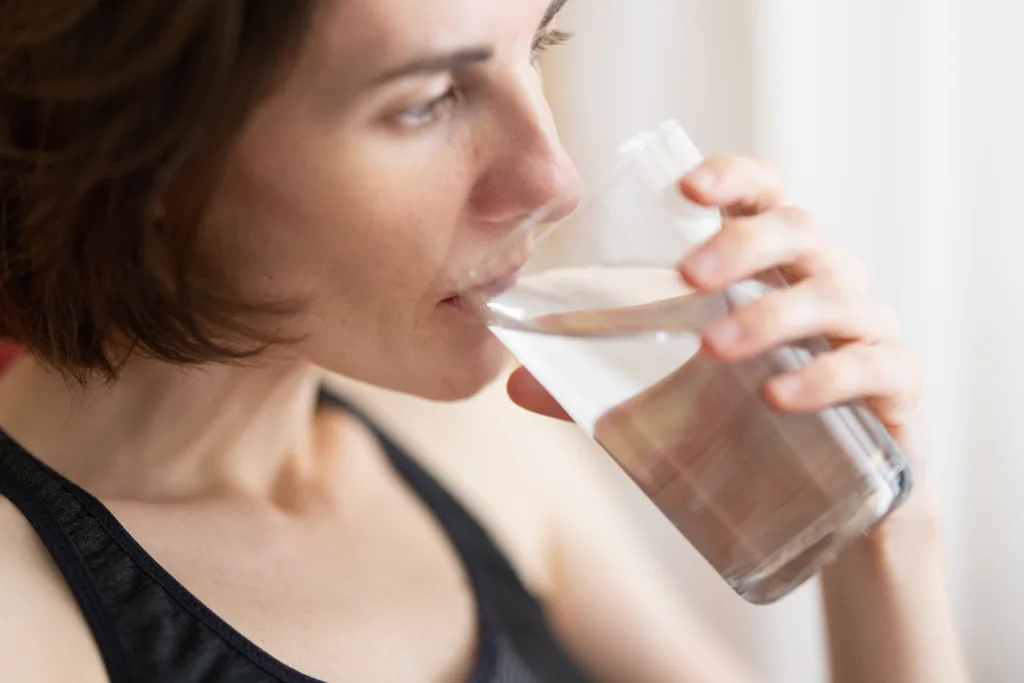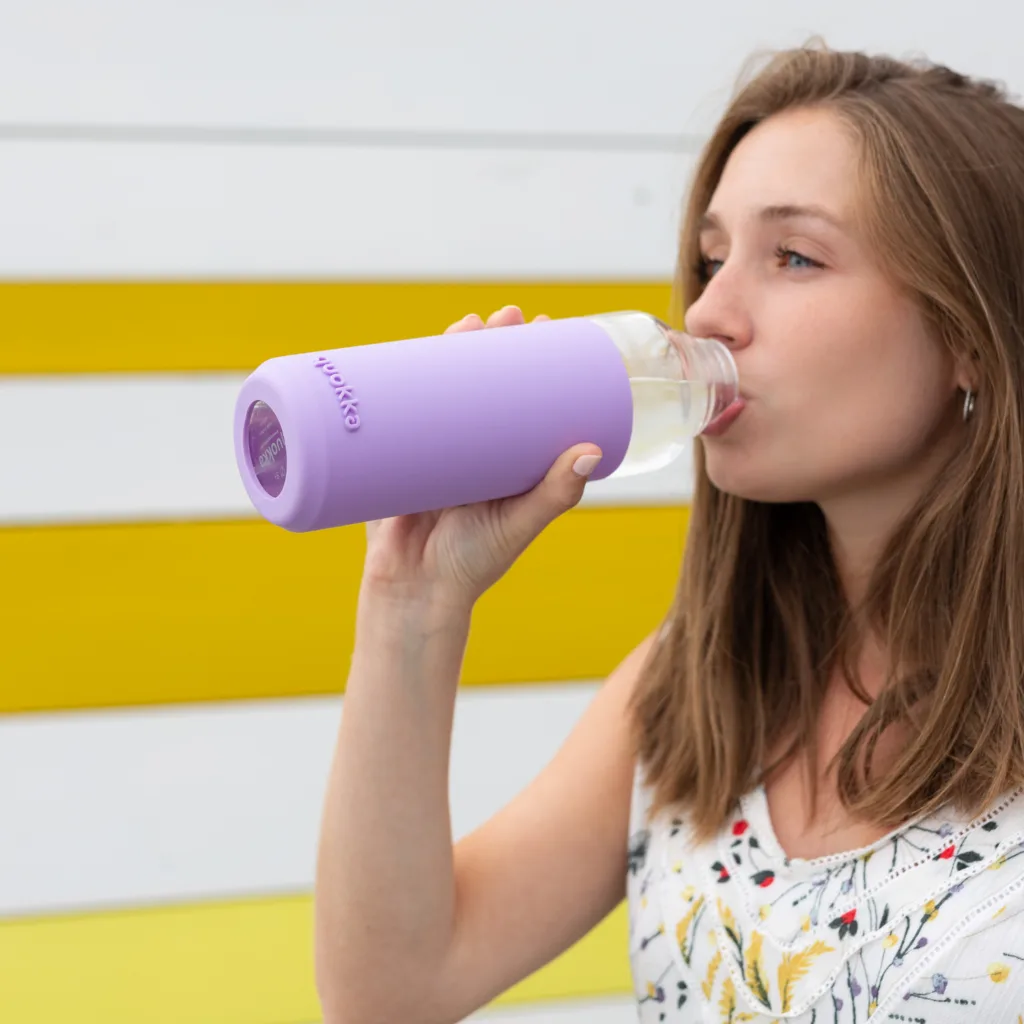Water is essential for human survival, and it is recommended that adults drink at least eight 8-ounce glasses of water per day. However, some people believe that drinking more water can have additional health benefits. In this blog post, we will explore the benefits and risks of drinking two gallons of water per day.
The first question that arises is, can you drink too much water? The answer is yes. Drinking too much water can lead to a condition known as hyponatremia, which occurs when the body’s sodium levels become too diluted. Symptoms of hyponatremia include nausea, headaches, confusion, seizures, and even coma. However, it is important to note that this condition is rare and typically only occurs in extreme cases.
Now let’s explore the benefits of drinking two gallons of water per day. One of the most significant benefits is hydration. Drinking two gallons of water can help to keep the body hydrated, which is essential for maintaining healthy skin, hair, and nails. It can also help to regulate body temperature and prevent dehydration during exercise.
Drinking two gallons of water per day can also help to flush out toxins and waste products from the body. This can improve kidney function and reduce the risk of urinary tract infections. Additionally, drinking enough water can help to prevent constipation and promote healthy digestion.
Another benefit of drinking two gallons of water per day is weight loss. Drinking water can help to increase feelings of fullness, which can reduce the amount of food you eat. It can also help to boost metabolism, which can promote weight loss.
However, it is essential to note that drinking two gallons of water per day may not be appropriate for everyone. People with certain medical conditions, such as kidney disease, may need to limit teir water intake. Additionally, drinking too much water can lead to electrolyte imbalances, which can cause muscle weakness, cramps, and even heart problems.
Drinking two gallons of water per day can have several health benefits, including hydration, toxin removal, improved digestion, and weight loss. However, it is important to listen to your body and adjust your water intake accordingly. If you have any concerns about your water intake, it is always best to consult with a healthcare professional.
The Effects of Drinking Two Gallons of Water a Day
Drinking 2 gallons of water a day may not be harmful for some people, but it is generally not necesary for most individuals. The amount of water you need to drink each day depends on various factors such as your body weight, activity level, and climate. The recommended daily water intake for adults is around 8-10 cups or 64-80 ounces, which is equivalent to half a gallon to a gallon of water per day.
Drinking excessive amounts of water, such as 2 gallons a day, can lead to a condition called hyponatremia, which occurs when there is an imbalance of electrolytes in the body due to an excess of water intake. Symptoms of hyponatremia include nausea, headache, confusion, seizures, and in severe cases, can lead to coma or death.
It is important to listen to your body and drink water when you are thirsty. If you engage in intense physical activity or live in a hot climate, you may need to drink more water to stay hydrated. However, if you have any medical conditions such as kidney disease or heart failure, consult with your doctor before increasing your water intake. drinking 2 gallons of water a day is not necessary for most people and can be potentially harmful.

The Benefits of Drinking Two Gallons of Water a Day
While staying hydrated is important for overall health, drinking two gallons of water a day may not be necessary or even recommended for everyone. It is generally recommended that adults drink at least 8 cups, or 64 ounces, of water per day. However, for some individuals, such as athletes or those living in hot and humid climates, more water may be necessary to replenish fluids lost through sweating.
Drinking eough water can provide a number of benefits, including improved digestion, better skin health, and increased energy levels. Staying hydrated can also help regulate body temperature, support the proper functioning of all organs, and provide essential lubrication for joints. Additionally, drinking enough water can help prevent urinary tract infections and kidney stones.
However, it is important to note that drinking too much water can also be harmful. Overhydration, or hyponatremia, can lead to symptoms such as nausea, headache, and confusion, and in severe cases, can be life-threatening. It is always best to consult with a healthcare professional to determine the appropriate amount of water for individual needs.
Is Consuming Three Gallons of Water Daily Excessive?
Drinking 3 gallons of water in a day is too much for most people. The amount of water a person needs to consume in a day depends on various factors such as their body weight, activity level, and the climate they are living in. The general guideline for the average person is to drink eiht 8-ounce glasses of water per day, which is equivalent to 64 ounces or 1.9 liters. However, this amount can vary based on individual needs. Drinking excessive amounts of water can lead to a condition called hyponatremia, which occurs when the body’s sodium levels become too diluted. This can be dangerous and can lead to symptoms such as nausea, headache, seizures, and even coma or death in severe cases. Therefore, it is important to drink water in moderation and consult a healthcare professional if you have any concerns about your water intake.
Recommended Daily Water Intake for Two Days
The amount of water that you should drink in 2 days depends on varius factors, such as your age, weight, gender, physical activity level, and climate. However, as a general guideline, it is recommended to drink at least 1 gallon or 3.8 liters of water per day for adult men and women. Therefore, if you want to maintain proper hydration levels, you should aim to drink at least 2 gallons or 7.6 liters of water over the course of 2 days. This amount can be adjusted based on your individual needs and may need to be increased if you are engaging in intense physical activity or if you are in a hot or dry climate. It is important to listen to your body and drink enough water to avoid dehydration, which can cause fatigue, headaches, and other health problems.
How Much Water Is Considered Too Much Per Day?
Drinking water is essential for maintaining good health and staying hydrated. However, it’s important to be mindful of how much water you consume in a day. Drinking more water than your kidneys can eliminate could lead to a condition called hyponatremia, which occurs when your blood sodium levels become diluted. The kidneys can eliminate approximately 27 to 34 ounces of water per hour, or a total of 676 to 947 ounces (20 to 28 liters) per day. Therefore, consuming more than this amount could put you at risk for hyponatremia. It’s important to listen to your body and drink water when you feel thirsty. If you have concerns abot your water intake, speak with a healthcare professional for personalized recommendations.

The Benefits of Increasing Water Intake
When you start drinking more water, your body will undergo several changes that can have a positive impact on your health. Firstly, you may notice that you urinate more frequently. This is because water helps to flush out toxins and waste products from your body, leading to a more efficient urinary system.
Secondly, you may feel less hungry and even experience weight loss. Drinking water before meals can help you feel fuller and reduce your oveall calorie intake. Additionally, water can boost your metabolism and help your body burn more calories, leading to weight loss over time.
Thirdly, you may experience more comfortable digestion and less heartburn. Water helps to lubricate your digestive system and prevent constipation, making bowel movements easier and more regular.
Lastly, drinking more water can have numerous other benefits, including clearer skin, improved brain function, and increased energy levels. It is important to note that everyone’s body is different and the effects of drinking more water may vary depending on your individual health and lifestyle factors. However, overall, increasing your water intake is a simple and effective way to improve your overall health and well-being.
The Effects of Drinking a Gallon of Water a Day on Weight Loss
Drinking a gallon of water a day can aid in weight loss. One of the ways in which drinking water can help with weight loss is by curbing hunger cravings. By drinking water befre meals, it can help you feel fuller and reduce the amount of food you consume. Additionally, drinking water can help boost your metabolism, which can help burn more calories throughout the day. It is important to note that drinking water alone will not lead to significant weight loss, but when combined with a healthy diet and exercise, it can be a helpful tool in achieving weight loss goals. It is also important to consult with a healthcare professional before drastically changing your water intake or starting a weight loss program.
How Much Water Should I Drink Daily to Lose Weight?
To lose weight, it is recommended that you drink at least 64 ounces or eight cups of water every day. However, it’s important to note that this is a general guideline and may vary depending on your individual needs. Factors such as your weight, activity level, and climate can all impact how much water you need to consume. It’s also worth noting that drinking water alone may not be enouh to aid in weight loss, but it can certainly be a helpful addition to a healthy diet and exercise routine. Additionally, you can obtain about 20 percent of your daily hydration needs through your diet, so incorporating water-rich foods like fruits and vegetables can also contribute to meeting your hydration goals.
Signs of Drinking Too Much Water
To determine if you are drinking too much water, you should pay attention to the signs and symptoms that your body may be exhibiting. One of the main indicators is overhydration, which can cause nausea or vomiting, confusion, or even seizures in severe cases. Additionally, you may experience throbbing headaches, muscle weakness, and fatigue. Your body may also show discoloration in your hands, feet, and lips, and you may experience cramping in your muscles. It is important to listen to your body’s cues and not force yourself to drink excessive amounts of water. Thirst is a natural signal that your body nees water, so use it as your guide to stay hydrated and healthy. If you have concerns about your water intake, consult with a healthcare professional for personalized advice.

The Effects of Drinking 5 Gallons of Water a Day
Drinking 5 gallons of water a day is an excessive amount of fluid intake and can lead to severl health problems. Firstly, it can dilute the concentration of electrolytes (sodium, potassium, chloride, and bicarbonate) in your body, leading to a condition called hyponatremia. This condition can cause symptoms such as headaches, nausea, confusion, seizures, and in severe cases, coma or death.
Additionally, drinking excessive amounts of water can put a strain on your kidneys. Your kidneys are responsible for filtering excess water and waste products from your blood. Drinking too much water can cause your kidneys to work harder than they should, leading to potential kidney damage or failure.
Moreover, drinking 5 gallons of water a day can also cause problems with your urinary system. Your bladder can only hold a certain amount of urine, and consuming excessive amounts of water can cause your bladder to become overfilled, leading to discomfort, frequent urination, and even urinary incontinence.
Drinking 5 gallons of water a day is not recommended and can lead to serious health problems. It is important to drink water in moderation and listen to your body’s signals of thirst and hydration.
How Many Ounces Are There In A Gallon?
In U.S. measurements, a gallon is equivalent to 3.785 liters. Therefore, there are 3.785 liters in a gallon. This is a common conversion used in many countries, including the United States. It is important to note that this conversion only applies to liquid measurements, as the volume of solids can vary significantly depending on their density. Knowing this conversion can be helpful when measuring or purchasing liquids, especially when dealing with recipes or other applications that require precise measurements.
The Effects of Drinking Water on Urination Frequency
When you drink water, it increases the volume of fluid in your body, which stimulates your kidneys to produce more urine. The kidneys are responsible for filtering waste products from the blood and removing excess fluids from the body. When you drink water, the kidneys are able to work more efficiently in flushing out waste and excess fluids. As a result, you may notice that you need to urinate more frequently when you increase your water intake. Additionally, the bladder can only hold a certan amount of urine, so if you consume more fluids, you will need to empty your bladder more often. However, excessive urination may also be a sign of a medical condition such as urinary tract infection, diabetes or overactive bladder. If you experience frequent and/or excessive urination, it is important to consult your healthcare provider to rule out any underlying health issues.
The Health Benefits of Drinking Healthy Water
When it comes to choosing the healthiest water to drink, mineral and pure spring water are considered to be among the top choices. This is because they are naturally sourced from underground or surface springs and do not undergo any chemical treatments or processing.
Mineral water is rich in essential minerals such as calcium, magnesium, and potassium, which are all beneficial for maintaining healthy bones, muscles, and overall body function. Pure spring water, on the oher hand, is free from any impurities and contaminants, making it safe and healthy to drink.
It is important to note that filtered water is also a good option, as it removes harmful contaminants and chemicals, but it may also remove some essential minerals. However, many filtering systems nowadays are designed to retain these minerals, making it a safe and healthy option to drink.
Ultimately, the healthiest water to drink depends on your personal preferences and needs. It is recommended to drink at least eight glasses of water per day to stay hydrated and maintain optimal bodily functions.

How Much Water Should I Drink to Lose Weight?
To determine how many gallons of water you need to drink to lose weight, you first need to calculate your daily water intake based on your body weight. The general recommendation is to drink half of your body weight in ounces of water. For instance, if you weigh 150 pounds, you should aim to drink 75 ounces of water per day.
To convert ounces to gallons, you can divide the total ounces by 128, which is the number of ounces in a gallon. So in the example above, 75 ounces of water is equal to approximately 0.59 gallons per day.
However, it’s important to note that drinking water alone is not a magic solution for weight loss. While staying hydrated is essential for overall health and can aid in weight loss by promoting feelings of fullness and increasing metabolism, it’s just one piece of the puzzle. To achieve sustainable weight loss, it’s also important to maintain a balanced and healthy diet, engage in regular physical activity, and get eough sleep.
Conclusion
Water is an essential element for the proper functioning of our bodies. It is important to stay hydrated by drinking enough water daily to regulate body temperature, provide lubrication for every joint, get rid of waste products and toxins, and support the proper functioning of all organs. The amount of water a person needs varies depending on their weight, activity level, and the climate they are living in. While there are diffrent recommendations for how much water a person should drink daily, health experts commonly recommend eight 8-ounce glasses or about 2 liters, or half a gallon a day. Drinking enough water is a simple yet effective way to maintain good health and wellbeing.
